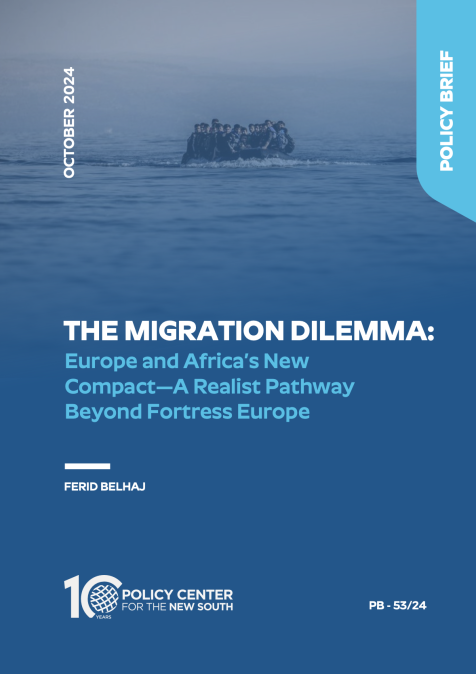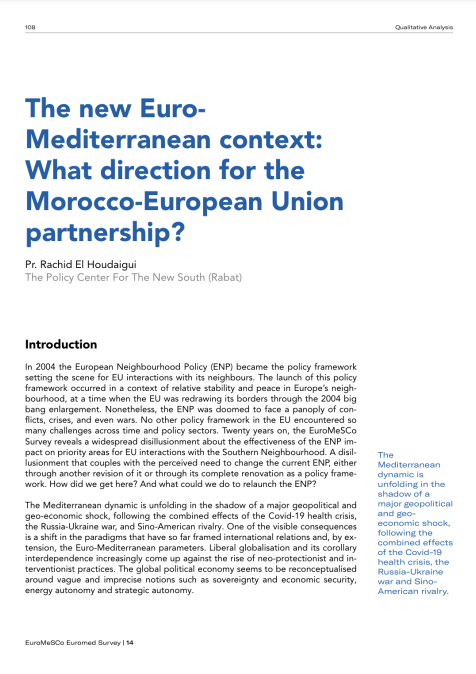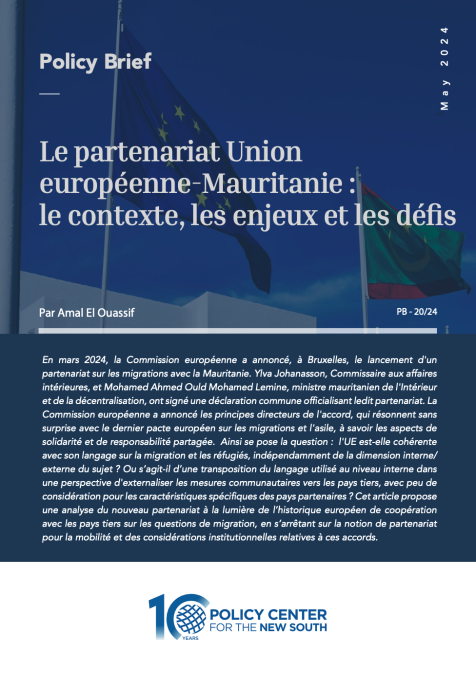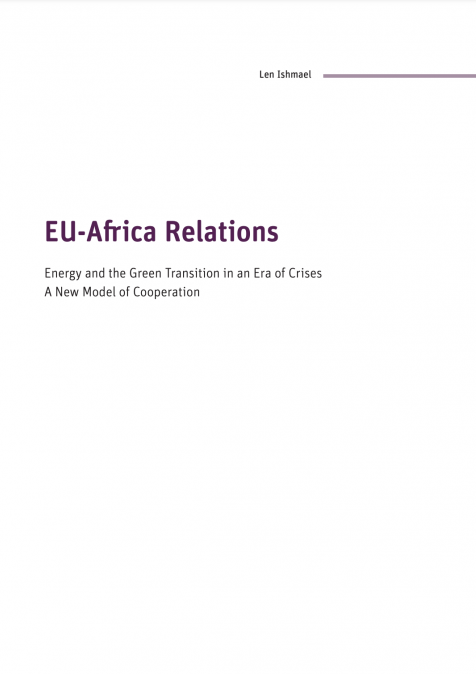Publications /
Opinion
The African Union (AU) and the European Union (EU) have never struggled to list common areas of interest or set up thematic partnerships and joint initiatives. The persistent challenge however is translating these partnerships into impact for both blocs of nations, particularly where interests diverge, such as those related to migration and green transition.
Fifteen years since the critical Lisbon summit and the Joint Africa-EU Strategy, the time to move is now. To make the partnership work, both parties need to reconsider their respective approaches. The EU will need to draw lessons from past limitations and its competitors’ success, and adapt its approach to better reflect African interests and expectations. African countries in turn will need to come together and create suitable continental frameworks that can more effectively respond to the expansive partnership ambitions.
The sixth EU-AU Summit is taking place on 17 and 18 February in Brussels after numerous delays due to the COVID-19 pandemic. While the summit is unlikely to bring many surprises, recent discourse on both sides suggests a more balanced relationship than in the past. This may be in part due to Africa’s growing economic power and global political economy factors, particularly the role of China and other emerging partners in Africa, as well as the pandemic. It also reflects the learning curve of both the AU and the EU in their foreign partnerships, and deepened relationships between individual African and European leaders.
That said, the agenda and approaches are still largely led by Europe, with its continuing parade of strategies and initiatives such as the Global Gateway, the added value of which is often unclear. The major announcements for the EU-AU Summit will likely be the Africa-Europe Investment Package, accompanied by specific initiatives like the Africa-EU Green Energy Initiative, and potentially more details on the rechanneling of special drawing rights (SDRs), health systems, agriculture, digital economy, and peace and security.
The African Center for Economic Transformation, the European Centre for Development Policy Management, the Policy Center for the New South and the Institute for Security Studies are launching a new initiative that will unpack AU-EU cooperation in the current global context. We call for a significant diversification of African and European perspectives to inform viable policy options. Strengthening AU-EU relations cannot be done in Brussels and Addis Ababa alone. This is why we will work to broaden the policy research community, bringing in voices from outside the institutional circles and connecting the partnerships with the day-to-day realities in African and European countries. We will do this by looking at critical areas of the partnership agenda.
The green transition may be the most challenging area of cooperation for the AU and the EU. While the EU wants to fundamentally transform its carbon intensive economy and advocates for net-zero worldwide, Africa is trying to pursue an equitable low-carbon economic development for the continent, while reducing its high vulnerability to climate risks through adaptation.
For an AU-EU partnership on climate to succeed, the EU will need to clearly recognise the global climate injustice, announce sufficient additional financing, and commit to pursuing a just transition for African economies. This means ensuring that African countries can benefit from a global green transition, in the form of new jobs, industrial development and clean energy. It should be seen to facilitate African industrialisation, even if this means accepting and supporting alternative decarbonisation pathways, or a different role for natural gas in Africa.
Health is one area where the EU and the AU can work together for long-term solutions for a coordinated health system approach. It is a key priority for both partners, as witnessed by the recent initiatives led by the AU (the Partnership for African Vaccine Manufacturing and the recent establishment of the African Medicine Agency) and the EU (the Team Europe Initiative on manufacturing and access to vaccines, medicines and health technologies in Africa).
Africa and Europe can use current political momentum to stimulate investment in prevention, support regulatory harmonisation and local pharmaceutical manufacturing, while also supporting technology transfer, multidisciplinary research that is sensitive to African research agendas and strengthening the health workforce. These endeavours should aim at addressing the pressing needs and deep fragilities that Africa was already encountering before 2020.
Digitalisation holds immense promise for both continents, but Africa is yet to define its own approach and there are fears that, if not managed well, digitalisation will lead to job losses. There are concerns about appropriate policies for the use of artificial intelligence, data protection and privacy, particularly in nations with poor governance. In Africa there needs to be much more focus on digital skills.
Europe and Africa face different challenges on innovation. Europe is struggling to maintain its innovation advantage, while the African continent is yet to develop robust innovation ecosystems. The AU-EU Digital 4 Development (D4D) Hub can be an important driver, but more urgency is needed in both Unions.
On trade, the African Continental Free Trade Area (AfCFTA) is an ambitious initiative that should help African countries diversify their productive capacities and integrate into regional and global value chains. AU member states need to ensure coherence of their regional and continental trade relations, to bridge regional disparities and ensure that bigger economies implement the required trade protocols. The EU's approach to trade with Africa continues to be based on a set of Economic Partnership Agreements (EPAs) and the Association Agreements (AAs) with North African countries.
The challenge for the EU is to strike a balance between a continental approach and more customised engagement, taking into account the diversity of partnership status vis-à-vis Europe. In addition, the EU can provide technical support for those AfCFTA reforms related to rules of origin, reducing the costs of logistics and improving the business environment.
Without significantly increased investment, Africa will continue to face a paucity of jobs, which exacerbates challenges related to migration, climate, health, and peace and security. The EU has recognised Africa as a key investment destination and has championed many investment initiatives, but with only partial success.
An imperative to success is moving to new processes that reflect full African ownership – including by the private sector – and move beyond a public sector, donor-recipient approach. Unless the private sector is fully engaged, investment initiatives will not succeed. Such engagement will need to include joint platforms for investment, financial institutions and European and African investment promotion agencies. In addition, the creation of transparent, harmonised and safe African legal and regulatory frameworks are a conditio sine qua non for attracting further productive investment from Europe and beyond.
It is evident that the European Commission and the African Union Commission are committed to a deepened partnership and cooperation, but it is difficult to make it work for all AU and EU member states. On the themes above, we intend to crowd in additional voices and perspectives to inform transformational policy and come up with concrete recommendations. With more voice, focus, commitment, transparency and a recognition of mutual interests, the AU-EU partnership can become more meaningful for all.
This commentary is a joint effort between staff and fellows at four policy institutes in Europe and Africa seeking to advance AU-EU dialogue and cooperation. Contributors include Rob Floyd and Freda Yawson from the African Center for Economic Transformation in Accra, Ghana; Chloe Teevan, Alfonso Medinilla, Philomena Apiko and Kathleen Van Hove from the European Centre for Development Policy Management in Maastricht, the Netherlands and Brussels, Belgium; Abdelaaziz Ait Ali, Larabi Jaïdi and Akram Zaoui from the Policy Center for the New South in Rabat, Morocco; and Paul-Simon Handy and Selam Tadesse from the Institute for Security Studies in Addis Ababa, Ethiopia.
Photo courtesy of Paul Kagame via Flickr.








